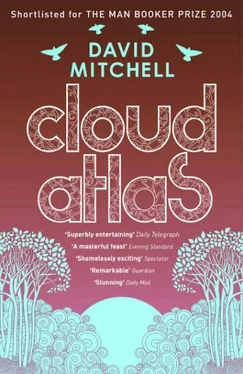“Among every generation of Yup’ik,” Lily told me, “there are those who are granted special sight, and special powers.” If you were sick, if you were worried about the presence or absence of fish or game, you went to the shaman. When to move to fish camp, when to return to town-all these things the shaman knew. But, she added, “the missionaries hated shamans. They told the people that the shamans were just magicians-people who got in the way of God.”
Peter had gotten in the way of God for a long time and had suffered for it, suffered physically he told people, as though God were throwing an elbow every time they passed. Old and hurting and lonely, Peter was looking for someone to take his place.
But Lily? Could it be possible that the magic should have survived in this girl? Lily’s long-gone father was a kass’aq; she was being educated far from home; she was female. But after a day of observing her and another day speaking with her, Peter decided that Lily was, in fact, gifted.
Or rather, able to receive the gift: it really wasn’t for him to choose; they’d have to go out, deep into the tundra, to see for sure.
He wouldn’t tell her where they were going, he wouldn’t let anyone else come with them. They traveled downriver for several miles, until they came to a bend where the river had worn much of the bank away, exposing a small bluff that looked as though it were built of layered chocolate. He found a place to beach the boat, and had her climb up the bank with him. Then they went walking. Do not be afraid, he said, but this is a place for—
“Ircenrrat.” Lily knew this. Little people. Sprites. They could be friendly or not, Lily told me, depending on how you behaved. There beside Peter, Lily was worried. Walking along that eroded stretch of riverbank was not good behavior. Growing up, she’d always been told to avoid this place.
“Let’s look for mouse food,” Peter said. Lily just wanted to leave, but Peter insisted. Tundra lemmings foraging for the winter would often build up little subterranean caches of roots and stems that Yup’ik men and women would later seek out. (Dried fish or cracker crumbs might be left by way of thanks.) It took a practiced eye to spot and follow the little pathways the lemmings wove through the tundra, and a practiced hand to find the soft or spongy areas that signaled a likely spot. Lily was surprised to see that she was having more success than Peter.
She was looking over at him at one point, wondering what he was up to, as she sunk her hands into the tundra moss and cottongrass. Then she felt something odd-warm and slick. When she looked down, she saw that she’d uncovered a roiling cache of insects-worms, beetles, ants, all slithering through her fingers. She yelped and tried to leap up, but somehow, Peter had made it to her side. He held her down.
“ Melquripsaq: the worms, the insects! You have found them,” he said, smiling and breathless. “The ircenrrat have let you find their magic.”
“Let go of me!” said Lily, about to scream. Several of the insects- bigger and stranger than ones she’d ever seen-had begun to trail over her wrists, up her forearms.
“Wait,” Peter said. “Let it come to you.”
“No!” Lily shrieked. She could feel them swarming now, prickling up past her elbows.
“Wait!” Peter shouted. “You’ll see! You must do this!”
“No!” Lily yelled, and broke free. She swung her arms wildly, clapped her hands together, scraped at her scalp.
Peter fell to his knees and searched the grass. “Too soon,” he cried.
Lily looked down. Her arms were clear. She looked around. No trace of insects. She walked back to the cache. Empty.
Peter stood and walked back to the boat. “I cannot say what will happen to you now,” Peter said once she’d joined him. Lily later left for Fairbanks without his having said another word to her. His daughter did not return to school.
Lily told no one about her trip out on the tundra with Peter. But back at school, if the other girls ever started talking about shamans, about the stories the elders used to tell, Lily would listen carefully. That’s how she learned that her experience was not unique; many shamans before her had sought and received their powers the same way. One or two of the other girls said they had uncovered buginfested caches as well, but none had ever plunged their hands in, frightened either by the bugs themselves or because they knew magic was at work.
And something was at work in Lily. A strange thing had happened after she’d left the tundra with Peter. Her previous abilities had dimmed. Where once she could look at a girl, even from a distance, and know her village, what her father was like, whether she’d been kissed, or smell the air midwinter and know if the summer would be wet or dry, now she needed to touch something to know anything about it at all. Even then, the knowledge she gained was shot through with static, sometimes to the point of incoherence.
She tested herself and found she did better with people than with objects. She might sit at a desk or hold a book and get a sense of who had done so before her, but these stirrings were faint. But if she shook a hand, received a hug, that contact might grant her visibility into the other person’s past or, more rarely, future. Sometimes she’d feel a strange sensation in her hands and forearms- qunguaguuk ,-as though the insects she’d uncovered were skittering along her skin once more.
She returned to Bethel at the end of the school year, but it was a bitter homecoming. Peter had died, his family moved away. Before he’d died, though, he must have told others about the trip he and Lily had taken, because everyone knew what had happened. No one approved.
Those who had rejected traditional beliefs and become enthusiastic converts to Christianity rejected Lily for seeking to indulge in “the black arts,” as one missionary termed it. But Lily received even sharper censure from those elders who still had an admiration for, if not faith in, older Yup’ik traditions. A gift had been presented to Lily, and she had refused it. On the tundra, rejecting a gift freely given-whether the gift was shamanic powers or the season’s first seal-was unconscionable.
But then, what do you expect, people said. She’s a girl. A girl whose mother disappeared with a Russian sailor. This girl, half Yup’ik, a shaman? Peter had made a mistake. The ircenrrat had made a mistake. Lily tried to explain, she hadn’t sought the job, she didn’t want the job, but that only made matters worse.
In time, Lily realized that it wasn’t just her who was making the Yup’ik community mad. It was the world, its missionaries, its kass’at , all flooding the tundra with new ways, food, language, ideas. Even if one no longer needed the services of a shaman to heal a sick child or predict weather, you still wanted one around, as a link to that other, older world they’d all once known. And with Peter dead, and Lily ducking the job, there really wasn’t anyone around. Now, there was a young man from Lower Kalskag, a good distance upriver, who came to town occasionally. There were those who said he was a shaman, said they’d even seen him fly. But others said he only flew when he drank, and the only way you’d see him fly is if you drank, too-a lot.
Townspeople pressured Lily to leave. Go to your parents, they said. Go to Russia, they said. Go live with the other kass’at. Leave us alone. Lily weathered a winter of this and then decided to do as she was told. She’d go to Anchorage. And from there, maybe Russia. Maybe anywhere.
She waited through the spring, and just as the summer began and she was getting ready to leave, she found a reason to stay.
Читать дальше












